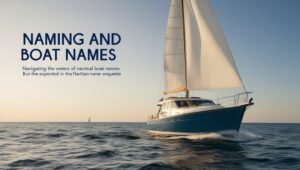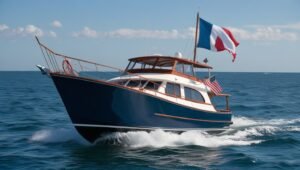
And Boat Names: Navigating the Waters of Nautical Name Etiquette
Boating is a unique and beloved pastime offering a sense of freedom and adventure on the open water. An important part of this experience is naming one’s ship—a tradition that dates back to maritime history. However, not all boat names are created equal. Some names are celebrated for their wit, charm, or sentimentality, while they may be banned in certain contexts. Naming a boat is more than just a creative exercise. This has legal and social implications that every boat owner must consider. This article explores the realm of taboo boat names, exploring why some names are taboo, the consequences of choosing the wrong name, and how to make sure your boat name matches your personality and the sea. But the expected decoration reflects both.

Significance of Boat Name
Before we dive into the details of prohibited boat names, it’s important to understand why naming a boat is so important. Historically, boats have been named as a form of identification and protection. In many cultures, it is believed that naming a boat gives it a spirit or personality, which in turn protects the ship and its crew. This tradition is passed down from generation to generation, turning into a practice that is both personal and ritualistic. Today, boat names often reflect the owner’s personality, interests, or life experiences, serving as a statement of identity and pride.
Legal and Regulatory Considerations
In many countries, there are legal regulations regarding boat names, particularly for commercial vessels or those registered with a national authority. These regulations are to prevent confusion, ensure safety, and maintain standards of decency. For example, in the United States, the Coast Guard oversees the registration of vessel names for documented boats. They prohibit names that could easily be confused with distress signals or other vessels, and they generally avoid names that are vulgar or offensive.
Countries like the UK and Australia have similar guidelines. For example, in the UK the Maritime and Coastguard Agency (MCA) has the power to reject boat names that are deemed inappropriate or too similar to names on their registry. In Australia, the Australian Maritime Safety Authority (AMSA) also enforces regulations that prevent the registration of offensive or inappropriate names.
Why are certain boat names banned?
Obscenity and obscenity:
Boat names that contain explicit language, sexual provocation, or other forms of obscenity are often banned or frowned upon. While some owners may find humor in risqué names, they may cause discomfort or discomfort to others, especially in family-friendly marinas or communities. Examples of such names include sexual connotations or curse words. Authorities ban them from maintaining a respectful and inclusive environment.
Misleading names
Names that could easily be confused with emergency signals, such as The reasoning is simple: in an emergency, clear communication is critical, and any confusion caused by a misleading boat name can have serious consequences. Additionally, names that mimic official ship titles such as “Coast Guard,” “Police,” or “Rescue” are also prohibited, as they may cause unnecessary alarm or confuse other boaters. can be misleading
Cultural and religious sensitivity
Names that are offensive to certain cultures, religions, or ethnic groups are generally avoided or banned altogether. For example, a name that mocks religious figures or sacred symbols can be deeply offensive to people of those beliefs. This extends to names that may sound humorous in one context but are insulting or insulting in another. Officials enforce these restrictions to promote mutual respect and a sense of harmony among the boating community.

Trademarked Names
Using a trademarked or copyrighted name by a company or brand can lead to legal complications. For example, naming a famous brand, movie title, or character without permission can result in a trademark infringement lawsuit. While some boaters may be tempted to name their vessel after a favorite brand or fictional character, it’s important to do research and make sure the name doesn’t infringe on any intellectual property rights.
Obscene or graphic imagery
Some boat names may not contain explicit words but may imply or describe graphic imagery. Names that suggest violence, hate speech, or other disturbing content are often banned to maintain a peaceful and pleasant environment for everyone. These names can also reflect poorly on the owner of the boat, resulting in social ostracism or legal ramifications.
Consequences of choosing a banned boat name
Choosing a prohibited or inappropriate boat name can have many consequences, both legal and social. Legally, if a boat is registered with a prohibited name, the owner may be required to change it before being allowed to operate the vessel. In some cases, authorities may impose fines or penalties for non-compliance. For example, in the US, the Coast Guard can refuse to issue or renew documents for a vessel with a prohibited name. Similarly, marinas or yacht clubs may deny docking privileges to boats with offensive names, limiting where the owner can take their vessel.

Socially a poorly chosen name can lead to embarrassment or alienation within the boating community. Boaters are often proud of their vessels and the names they choose, but a name that is in poor taste can quickly become a source of ridicule. Additionally, boaters with offensive or inappropriate names may feel unwelcome at certain events, marinas, or gatherings, as others may not want to be associated with a vessel that carries negative connotations.
How to choose a unique and acceptable name.
Given the potential pitfalls, choosing the right name for your boat is crucial. Here are some tips to help ensure your boat name is unique and recognizable:
Do your research
Before deciding on a name it is wise to research existing boat names in your area or within the registry you plan to use. This can help you avoid duplication and help ensure your name is unique. Additionally, checking the meaning and connotations of a name in different cultures or languages can prevent unintentional offense.
Consider the audience
Think about where you will be sailing and who will see your boat name. If you frequent family-friendly marinas or attend community boating events, it’s best to choose a name that appeals to all audiences. A name that’s clever but offensive can still make a strong impression without crossing any lines.
Reflect your personality or interests
Your boat’s name should reflect you – whether it’s a play on words related to your profession, a reference to your favorite hobby, or a name that has personal significance. By choosing a name that’s meaningful to you, you’ll likely avoid the temptation to choose something bitter or controversial.
Keep it simple
A good boat name is often short, easy to pronounce, and memorable. Complicated names can be difficult to communicate on the radio or in awkward situations. A simple, beautiful name can stand out and be easily recognized without relying on shock value.
Get Feedback
If you’re unsure of a name, consider asking friends, family, or fellow boaters for feedback. They can offer valuable insight or point out potential problems you hadn’t considered. This collaboration can help you land a name that resonates with others while remaining true to your vision.

Examples of acceptable and creative boat names.
To inspire you, here are some examples of boat names that are creative, unique, and within acceptable limits:
Marine Nirvana This name combines a love of the sea with a sense of peace and relaxation.
Seize the Day A play on the phrase “seize the day,” the name inspires us to make the most of every moment on the water.
Aquaholic A fun and light-hearted name for someone who can’t get enough of the ocean.
Wind Dancer Conjures the image of a boat moving gracefully with the wind.
Island Time Perfect for those who enjoy a slower, more relaxed pace of island life.
These names strike a balance between being clever and tasteful, ensuring that they are well-received by both officials and fellow boaters.
Conclusion: Navigating the Naming Process
Naming a boat is a favorite tradition that allows owners to express their individuality and connection to the sea. However, the naming process must be navigated with care, taking into account both legal regulations and societal expectations. By avoiding taboo names and choosing one that is unique, appropriate, and reflective of your personality, you can ensure that your boat name will be a source of pride and joy for years to come. Whether you’re a seasoned sailor or a first-time boat owner, the right name can enhance your nautical adventures, making every trip more memorable.
